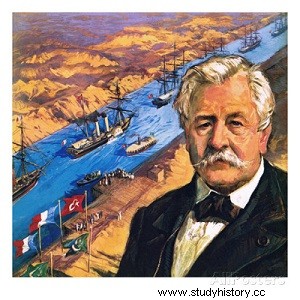
(Versailles, 1805 - La Chênaie, Indre, 1894.) Diplomat. He entered the Carrière in 1825 and was a member of the Consulate General in Lisbon. Employed in the offices of the commercial department at the Ministry of Foreign Affairs in 1827, he was appointed, on October 19, 1828, student-consul then, shortly after, attached to the Consulate General of Tunisia.
Ferdinand de Lesseps assisted Marshal Clauzel during a mission to Constantine in 1830. From 1831 to 1833, he served as student consul in Egypt. Promoted, on November 21, 1833, second class consul in Cairo, he managed twice the consulate general of Alexandria. In 1836, the cross of the Legion of Honor rewards the dedication he displayed during the plague epidemic that ravaged this city (1834-1835). During the occupation of Syria by Ibrahim Pasha, the diplomat ensured the protection of Christians and contributed to the reconciliation of the Egyptian viceroy with the Turkish sultan.
In turn consul of France in Rotterdam (1838), in Malaga (1839), in Barcelona (1842), where, during the Carlist war, he took excellent safeguards for the safety of the French who resided in the city, Minister of France in Madrid ( 1848), Ferdinand de Lesseps disapproved of the hostile attitude of the Legislative Assembly towards the Roman Republic and asked for his release on January 7, 1849.
Invited by the Viceroy from Egypt Mohammed Saïd, he returned to the banks of the Nile in October 1854. There he conceived the project of piercing the Isthmus of Suez, and carried it out, despite the many difficulties caused by England and Turkey. The work, undertaken without the assistance of the banks and thanks to a subscription of 200 million, will continue from 1859 to 1869. On November 20, 1869, Ferdinand de Lesseps is elevated to the dignity of Grand Cross of the Legion of Honor. A special law (July 8, 1868) had authorized him, in order to enable him to complete his work, to issue bonds redeemable with prizes by drawing lots.
Fort of his Egyptian success, the count, whom journalists wrongly describe as the Duke of Suez, aims to renew it in Central America:he decides to dig the Panama Canal. The Compagnie Interocéanique, which he founded on March 23, 1881, from capital entrusted to him by small French savers, went bankrupt. From this will be born a famous scandal.
The Court of Cassation, evoking the prescription, will cancel the sentence of five years in prison and the fine of 3,000 francs which had been imposed on Ferdinand de Lesseps , already half unconscious, and his son Charles.
